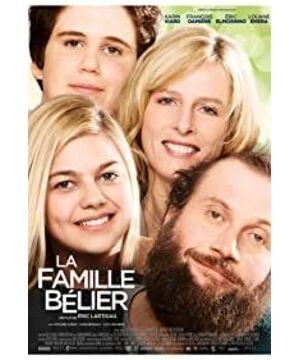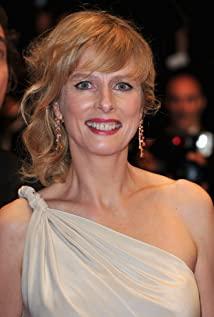I watched this movie because my French was too bad, and was suggested to watch a French movie by a foreign friend. So I bumped into this very frequent movie. At first, I thought it was a musical. How could I have such an illusion? The main reason is that the column "The Belliers" on the "Daily French Listening" app was full of songs, which led me to think it was a musical. I'm someone who would fall asleep listening to musicals, so even though the movie has been downloaded for a long time, it has been put on hold. Until I was suggested to watch French movies by foreign friends, I clicked all the downloaded movies for dozens of seconds to see which one suits my heart. When I clicked on this one, I found that it turned out to be the type I liked: bright colors, warm story, cute and eye-catching actors, and most importantly, this is not a musical! Yes, I have absolutely no resistance to this type of film, basically I am attracted by these points. That's it.
The story takes place in the French countryside. The color of the picture is very warm and bright, and it feels warm. In fact, it is a kind of pure and real feeling of cleanliness. There is nothing happier than a small country house, teenage boys and girls, sexy and beautiful parents.
But I'm not here to just comment on the movie. There are so many people commenting on the movie, so I don't need to go into details. Because I read the original novel of the movie, Chinese version, French version. I want to talk about the connection between the film and the novel, the translation of the novel and so on.
First, let’s talk about the difference between novels and movies.
First, the protagonist's name. The original French novel is called Les Mots qu'on ne me dit pas, which literally translates to: those things that don't tell me. The Chinese version is named Silent (Is the Chinese name very high!). If it is a novel, it is not actually a novel. It is the author's own experience. For convenience, it is called a novel for the time being. The author's surname is Poulain, which is mentioned in the original book, and this surname means pony. So the surname of the protagonist in the movie found the source: the protagonist's family is called Bélier, which means ram in French. Pony and ram are all animals, and the movie can be regarded as an innovation inspired by novels.
Second, family structure. In the original novel, the author's family has only one child, and he is a child with normal hearing. The other cousins are also children with normal hearing, but the previous generation are all deaf and mute. In the movie, the heroine has no cousins, but has a younger brother who is deaf and mute. There is also a reference to hearing grandparents in the original book, which is not present in the movie.
Third, the location. In the film it takes place in the countryside, while in the book it takes place in the city.
Fourth, little love. There are boys and girls in the movie who are ignorant and beautiful, but in the original book, there is not much description.
Fifth, the difference in the storyline. From the beginning of the film, it is the scene of the Bailey family having breakfast. To be honest, I didn't notice anything special when I watched it. I didn't know until I read the original book that the original author said that because the deaf and mute people can't hear their own voices, various movements will make loud noises, but they themselves don't feel that because they can't hear them. As a daughter with normal hearing, when I hear these everyday sounds, I feel very noisy, but there is nothing I can do. The movie is a little bit underwhelming, and as a viewer, I almost didn't realize it. The author described in the original work that her mother would fart on the street, because she couldn't hear it, and she would be embarrassed by her normal hearing. It's not mentioned in the movie, it may feel unrefined. However, there is a description in the movie that the heroine's parents are loud and loud on the bed and start at any time. Which one is more unremarkable, fart or bang bang, everyone has their own scale, but bang bang will always be popular and will attract people's attention, so the movie must not be missed. In fact, the description of deaf-mute people in the original work is more detailed. For example, deaf-mute people have strong desires because they can't speak, and their expressions are very direct, that is, they are expressed directly with their bodies. The deaf mother in the original book is very open and open-minded, and let her daughter take birth control pills during adolescence, just in case. It's just that the daughter has eaten for three years, but it is actually free, because the daughter with normal hearing does not have as strong a desire as the deaf and mute parents. It's just that I don't quite understand. The father in the movie is a little too strict with his daughter. They have sex at any time. When the father finds out that his daughter's male classmate is at home, the first thing he asks is if he has slept with him. However, his daughter said no, and he slapped her daughter. I can't understand this, it doesn't make sense logically, and it's inconsistent. Isn't this a strict requirement for others and a tolerance for oneself? Maybe the director and screenwriter just wanted to express that in the real world, there are too many people who are strict with others and treat themselves tolerantly. It is a popular social phenomenon in the world to be a bitch, hahaha, I can only explain it like this. There are no logical loopholes in the original work. Parents are very direct about the problem of their children's sex. Another point, which is not reflected in the film, is that in the world of the deaf, the language is very brief and direct. There is no French conjugation grammar in their expressions, which is a combination of words, so sometimes sentences that people with normal hearing think are normal may take some effort to explain to deaf people because the logic is different. This can only be felt by reading the original book. What we see in the movie is only the action, so the experience is not deep.
The overall feeling is that a movie is a movie, and the audience and box office should be considered. Small and fresh, young love, beautiful countryside, warm family, and harmonious interpersonal relationships are more popular now. After the film adaptation, the theme to be promoted is completely different from the original. What the film wants to express is the affection and tenderness between people. The original work is actually the author's love for deaf parents, as well as the daily life of deaf and hearing daughters, and everyone's efforts for the cause of the deaf. In the original book, what impressed me most was that the author mentioned that in France, even the deaf-mute people of the author's parents' generation did not have any good schools to give the deaf-mute people a formal education system. This is something I hadn't thought of at all. Because we were brainwashed by Western culture when we were young, that developed capitalist society like them is good at everything. But in fact, this is not the case. They have also experienced many difficulties and challenges before constantly improving the social system. They are also from nothing. So, this is very touching to me, because many times the unscrupulous public opinion orientation of my great empire will be biased towards one side and lead people to think how bad our own life is. We have many problems, but this does not mean that we have no hope, because the developed countries have come from our situation. We can find problems in time and learn from their experience. In fact, we can develop better and have time. It is better to work hard to develop ourselves, instead of blaming our own family members every day and doing nothing. Digging a little further, back to the movies and novels, the novels also describe in detail how deaf parents, aunts and uncles joined the tide of reform, striving for benefits and creating opportunities for the deaf. There are many descriptions of this in the original book. For example, her father participated in the compilation of a dictionary for the deaf and mute, and they did not have such a unified language before; aunts, aunts, and uncles participated in theatrical performances of the deaf and mute. In the original book, it was mentioned at the beginning of how his parents raised him when he was a child, which is completely invisible in this movie. The author did not stage a bitter scene to describe how difficult it was for her parents to raise her, but told us very truthfully that when she was a child, her grandparents felt that it would be more beneficial for her to grow up with normal people, so they sent her to a nanny for boarding. Sent as a baby. The nanny gave her sleeping pills just to keep her quiet. I was shocked to see this too! The same problem as before, the invasion of Western culture that I have accepted before makes me think that this kind of thing will not happen in Western countries, but in fact, this kind of thing will happen all over the world, no one is more advanced than anyone else, it will happen to everyone These shameless things. What we can do is do our best to improve and prevent these things from happening. Well, I admit that as I get older, It is no longer so easy to be fooled. The so-called good is not necessarily really good, and the so-called bad is not necessarily bad. Don't jump to conclusions about anything. Sometimes, our stupidity is often caused by too little reading and too narrow vision. If you can't travel far away physically, let your spirit travel far away, read more, and you won't be easily deceived. There was also a Chinese poster in the movie. At that time, I was brewing full of emotions along with the plot. When I suddenly saw this poster, I was in a play. This is also not the first time I have seen Chinese elements in foreign films. It seems that Chinese elements will appear more and more in foreign films, which is a trend. I think these may look very exotic, cool and compelling in the eyes of foreigners.
Next, let's talk about the Chinese version of the novel. The Chinese version of the novel was published by Xinxing Publishing House and translated by Yuan Xiaoyi. High quality paper. The translation is very warm and apt. Because in the original work, the author described the deaf-mute in the first person, and many words were in the deaf-mute style, that is, short and concise, with almost no long sentences. Therefore, I finished reading the Chinese version in one episode of "Ode to Joy 2". It's just that there are a few translations that I don't understand very well. I list them below, and the great gods can help me answer them. The original is the 2015 version of Le Livre de Poche:
1. The second paragraph on page 18 of the original work: Ma petite main attrape la rampe.
Literally: my little hand is clutching the stair railing.
The second paragraph on page 9 of the Chinese version: The corresponding translation cannot be found in the Chinese version.
2. The fifth-to-last paragraph on page 31 of the original work: Il est temps pour moi de voler au secours de ma mère.
Literally: It's time for me to rescue my mom.
22 pages of the Chinese version: The corresponding sentence cannot be found in the Chinese version.
3. The penultimate paragraph on page 37 of the original work: Eux aussi compensent.
Literally: they are also compensating.
Page 29 of the Chinese version: The Chinese version cannot be found.
4. First paragraph on page 55 of the original work: Il faut que je les avertisse, quand même.
Literally: I should still remind them.
Chinese version page 47: The Chinese version cannot find the corresponding sentence.
5. The first paragraph of the 60th page of the original work: Ainsi, mon prénom, mon signe, celui qui me caractérise moi et personne d'autre, c'est « Rêveuse ».
Literal meaning: So my name, my nickname, used to describe me, and others, is "Sleepwalker."
The last paragraph on page 51 of the Chinese version: Chinese version translation: Therefore, my nickname is "Sleepwalker", which is used to describe me, and of course it can also be used to describe others. My question is, is mon prénom not translated for fear of ambiguity?
6. Original book 64 to 65 pages
Chinese version, pages 57 to 58: The passages in the original book describing the author's dreams are italicized to distinguish reality. The Chinese version does not distinguish between fonts. When I first read it, I felt a little strange and a little awkward. After reading the original work, I found that adjusting it to italics really works better and is easier for readers to understand. I don't know if the font adjustment is not made in Chinese because there is no italic emphasis in Chinese?
7. The last three paragraphs of the original 76 pages: Ifonfrate et autoproute. Iphone 4 et autoroute.
Chinese version 69 pages: Chinese version translation: Oyster mushroom four and Kaosu Konglu. Apple Four and Freeway. This translation is very good. The original text says that a traditional Christmas game for children is to imitate the voice of deaf and mute parents and let everyone guess what it means. This translation reflects the voice of the deaf and mute people very well, and it is very vivid and funny when I read it.
8. The penultimate paragraph on page 82 of the original work: C'est bien ce qu'il me semblait.
Literally: that's how I feel.
Page 74 of the Chinese version: The Chinese version cannot be found.
9. The penultimate paragraph on page 106 of the original work: Alexis a une autre méthode. Ce qui l'amuse, c'est de raconteur n'importe de quoi à ses parents, qui l'écoutent religieusement.
Literal meaning: Alex has another way, what makes him laugh is to say something or not to the parents who are listening to him very religiously.
The last paragraph on page 93 of the Chinese version: The Chinese version translation is: Alex has another way, which I find interesting, and that is to say something casually, and his parents are always religious as religious. Does l'amuse translate here as "fun to him" instead of "me"?
10. The penultimate paragraph on page 152 of the original work: pas entendu, donc indicible.
Literally: Can't hear, can't describe.
Page 143 of the Chinese version: The Chinese version does not have this sentence.
The above are the questions I have when reading the Chinese and French versions, I hope you can give me some advice.
Let's talk about the original French version. The French version of the novel is very thin, the vocabulary is relatively simple, and the sentences are not long. But because of my level, I also spent a week referring to the Chinese version before reading the French version. The translation quality of the Chinese version is very good, and I can feel the feelings that the French version wants to express. If children who are still learning French have time, they can read this small book in French, because it is simple and can enhance confidence, instead of reading difficult books as soon as they come up, it is easy to give up.
In addition, thanks to the subtitle team, I copied all the French subtitles made by the subtitle team, compared Chinese and French, and learned spoken Chinese. Of course, many words are used in rural areas, but for me, I can really learn a lot. It took a month to copy the subtitles, and there are a few things that seem to be different from what I heard. I will summarize it later and discuss it with you. I hope that the great gods will continue to work hard and give us such a good translation.
View more about The Bélier Family reviews











